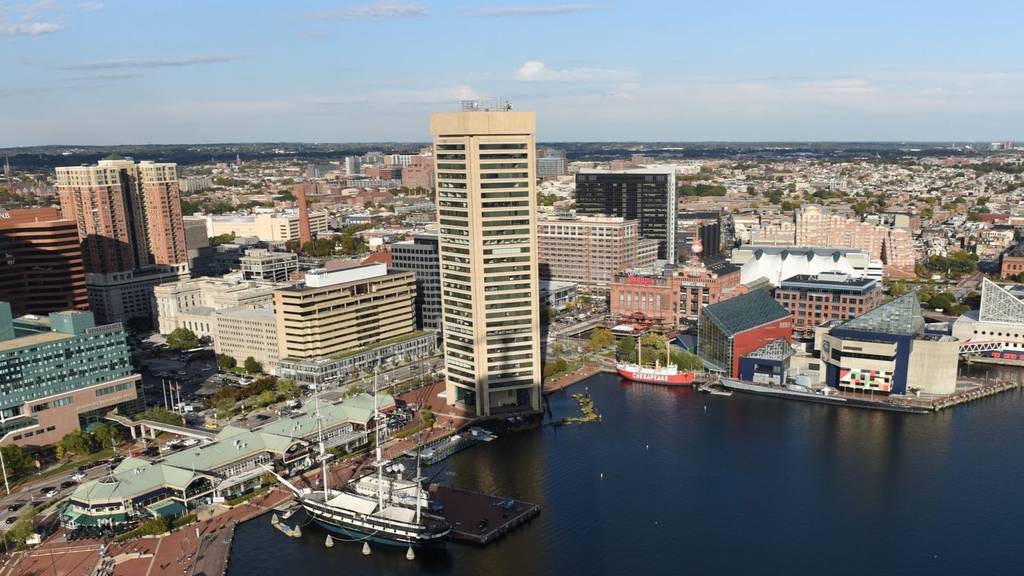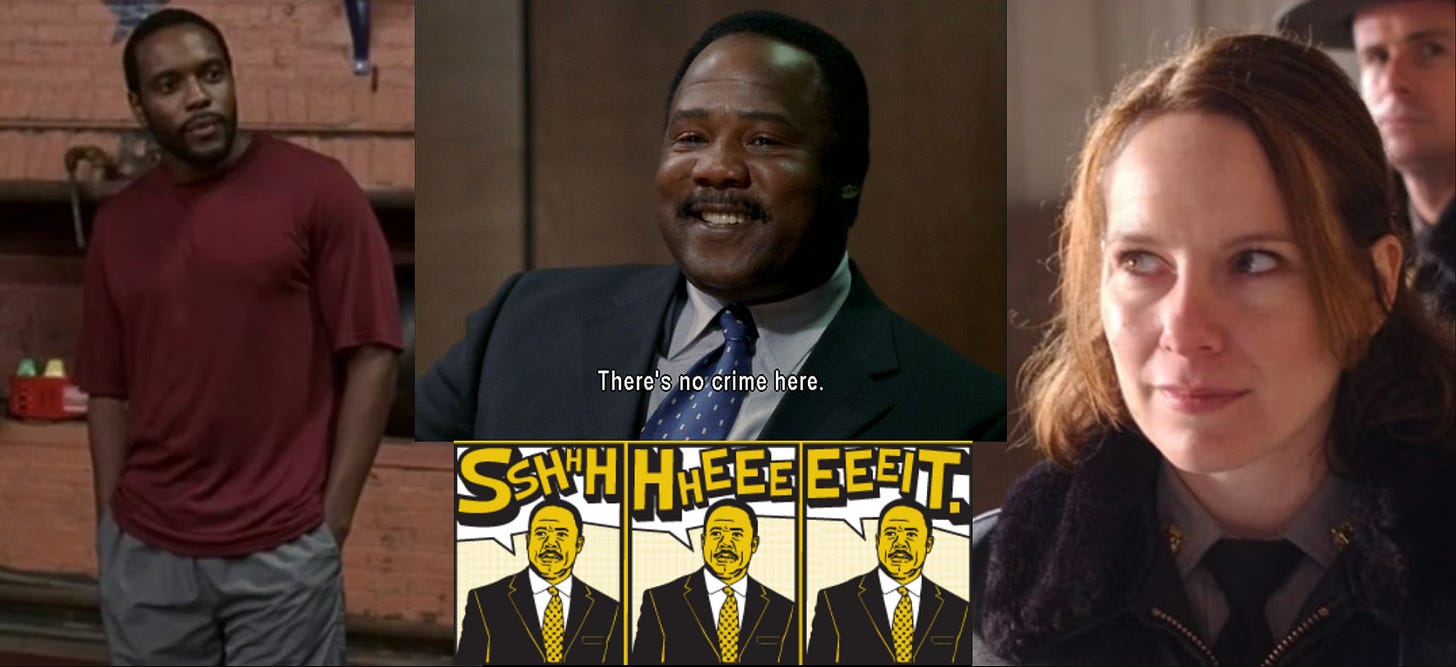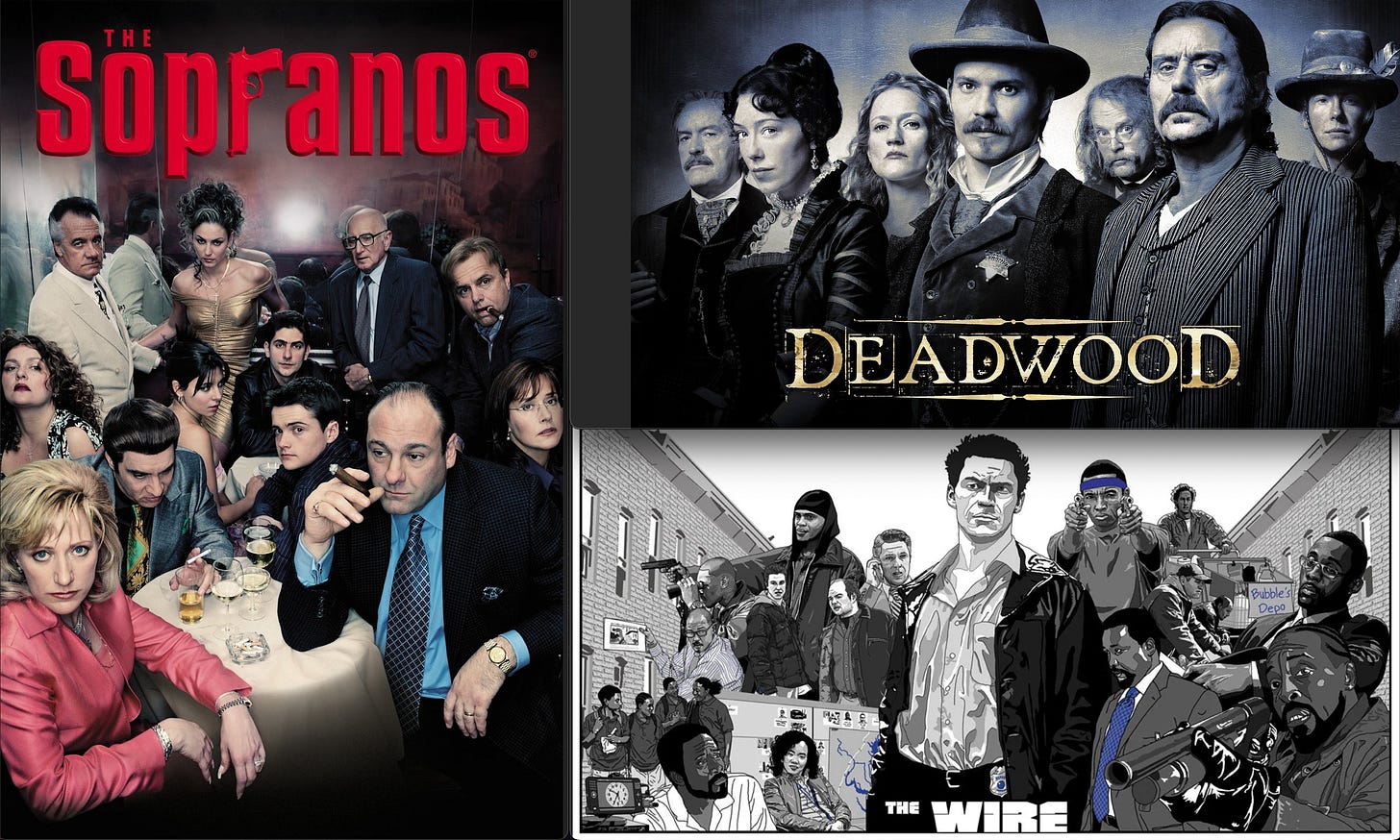BIG LIE: The Final Season of 'The Wire'
David Simon's Dickensian Television Masterpiece Looks Even Better In Hindsight
“The urge to save humanity is almost always a false front for the urge to rule. Thus, the most dangerous man to any government is the man who is able to think things out, without regard to prevailing narratives, superstitions or taboos. Almost inevitably he comes to the conclusion that the government he lives under is dishonest, insane & intolerable.” — H.L. Mencken
“It's been said that no man is a hero to a newspaperman, and I spent too many years as an ink-stained wretch. Everyone lies.” — David Simon
$ $ $ $ $ $
Viewing it for the first time in 15 years, I must offer mea culpas after re-finishing the 5th and final season of David Simon’s singularly excellent cops’n’crime HBO epic The Wire last week.
There’s a more ambitious analysis to be written about the entire thing, egocentrically but informatively integrating my Baltimore experience, which overlapped with the first couple seasons of the show. But today’s not that.
Instead I’ll focus only on that final season. Back in 2008 I wrote it was the weakest and least plausible, but 15 years later it looks a whole lot better, and not only because everything else has gotten so much worse (both on TV and IRL).
Reason I thought the fifth season of The Wire was the least credible back when I first saw it was cuz its season-long B-plot followed the sad shenanigans inside the newspaper business, most specifically the Baltimore Sun. What happens at the Sun seemed exaggerated to the point of ludicrous to me. At the time.
If you know anything about The Wire, you know that each season has its usual cast of cops and returning gangsters, while there’s a secondary major plot line set among differing societal strata in the city: The first season, it’s the drug trade, which remains a key subplot threaded throughout the series; the second, my favorite, follows embattled blue collar union workers in the Baltimore port; the third, the largely self-serving political hierarchy; the fourth, the broken school system; the fifth and final season, the ethically crumbling city newspaper.
In 2008, the corruption, devotion to “The Narrative” and shallow quest for industry awards at the expense of Truth that is depicted at the city’s daily Sun-paper seemed way over-the-top to me. Like, I knew the news biz was kinda corrupt, I’d seen it up close, but no way was it this corrupt.
Fifteen years later, however, the unscrupulous fundamental dishonesty that has proven a cancer inside corporate media feels hella more real. By the end of The Wire, the fealty to a dishonest but circulation-bumping Narrative has utterly destroyed the moral foundation of a once-great newspaper, and the lives of the few responsible journalists left in it.
First time I saw S05 of The Wire, I was like “Well, that’s sad but it would never happen this way.” This time, it felt all too credible. I was left emotionally shattered, because in it I saw a bit of myself and certainly multiple other good/better/martyred reporters I’ve known or followed.
The underlying theme of the fifth season of The Wire is the dark downward-spiral power of The Big Lie. The Lie Too Big To Fail. The Lie that everyone is forced to live inside because its exposure would lead to M.A.D.-ness.
In brief: Budget cutbacks have gutted Baltimore’s police department; important cases are going unmanned and unsolved. In order to bring attention to this, one desperate cop starts faking murders of homeless men (no shortage of homeless guys dying naturally, easily manipulated), leading to hyperventilating fear-mongering news coverage of a serial killer on the loose in Charm City that breaks into national media coverage. The escalating Narrative super-charges sales of The Sun in Maryland, makes its ambitious but dishonest crime reporter a coast-to-coast media figure, gets the BPD the additional funding they need to dig into real crimes, and propels the political career of Baltimore’s charismatic young mayor to the point where he sets his sights on Governor.
Everybody’s career hinges on the Big Lie set in motion by the fake murders. But there may be something even darker going on beneath the story’s surface when it comes to the Big Lie, Bigger Picture, Bigger Message.
The visual and dialog subtext in S05 of The Wire repeatedly looks and sounds like creator/show-runner/former Baltimore Sun scribe David Simon is telling those with Eyes to See that he knows what’s up. Or perhaps it’s just being channeled through him; I can’t even tell anymore, but I guess it doesn’t really matter.
I cannot find the exact scene because I don’t want to go FF through ten hours of programming (plus I want to get you to watch the series for yourself), but in one scene as the mass institutional deception is dawning on a few people, two characters are shown standing in front of Baltimore's World Trade Center at the Inner Harbor. I don’t remember the dialog exactly, but one of them says to the other something like "Sometimes a lie gets so big that even after everybody figures it out, nobody can afford to admit it.” In front of Baltimore’s 32-floor World Trade Center. Hint hint.

That’s the theme of S05 of The Wire: The Big Lie, and we’re all in on it. The show lays it out literally from the first pre-credits scene that launches the final season, where a murder suspect is fooled through the most ridiculous of lies into a confession, and one of the cops delivers the close-captioned dialog atop this page, basically that Americans are too trusting and too stupid.
We get that message echoed again, right away, in the immediate post-credit quote that accompanies every episode before it kicks into gear. S05E01 cites one of my favorite BPD detectives, Bunk Moreland (played by the badass teddy bear Wendell Pierce), also atop this page. It’s a truncated paraphrasing of Adolph Hitler: “The masses of a nation more readily fall victims to the Big Lie than the small lie…It would never come into their heads to fabricate colossal untruths, and they would not believe that others could have shamelessly distorted the truth so diabolically.”
There’s my Rule of Three. If you watch in full the fifth season of The Wire you’ll find more. Many more. Meanwhile, give me a few moments more before I make my way out.
Most relevantly, with the dual dueling Guilds of writers and actors on strike in Hollywood with no end in sight, pretty soon you’re going to need to find older great entertainment to divert and engross you, because nearly everything else is going to be either Reality TV or leftover garbage.
You will not do better than The Wire, unless maybe you watch The Sopranos or Mad Men. It is one of the greatest television series in history: Literary in its Dickensian narrative scope, it features at least two dozen memorable characters, and is overseen by a guy who lived among it, scripted by accomplished novelists and crime reporters, and helmed by adept film directors and top-flight prestige TV vets.
Each season is its own thing yet threaded with intertwined storylines that ultimately tie up into a what looks and feels like a noose for Baltimore and probably America, although, by series end, the trapdoor of the gallows has not yet dropped.
The series certainly shows how you do diversity right. At least half the key characters in The Wire are black, which is actually still lower than the norm if you follow Baltimore City’s demographics, where 63% of citizens are black (30% white; 5% Hispanic; 2% Asian).
But the series is far from Woke; it depicts the wide breadth of black culture in Baltimore, from the drug dealers and gang bangers to those caught up in “the Game” because there’s no other route for them to make money; from corrupt politicos and police leadership and craven ambitious church pastors to a few earnest local leaders, good hearted preachers and dedicated cops — an entire range of humanity, sometimes bad people doing decent things, sometimes good people doing wrong things. There are no caricatures, two-dimensional gangstas or “Magic Negro” tropes here.
The cast is always a big asset on that front — a crooked comic relief character like corrupt State Senator Clay Davis could’ve been a clown caricature if not for the phenomenally slimy yet fully human performance from Isiah Whitlock, Jr., for example (even though he’s a joy to watch, it almost seems unfair to single him out because there are many other well-drawn and performed supporting characters to choose from).

The ostensible lead protagonist is white, BPD detective Jimmy McNulty (played with a killer Bawlmer accent by the unfairly handsome English actor Dominic West). He’s a memorable and sympathetic flawed hero before he devolves into an anti-hero (and then back again), an alcoholic womanizing anti-authority egomaniac with a superiority complex who is also acknowledged by his often resentful peers as one of the smartest and best investigators in the city.
I agree McNulty’s one of the best, but the best detective IMHO is also my favorite character in the entire series, then and now, the mostly soft-spoken with a big intellectual stick Vietnam vet Lester Freamon, a black Sherlock Holmes and one of several partners McNulty has over the five seasons: methodical, patient, wise, avuncular, detailed and determined. We don’t meet Freamon right away, he’s got a small role through the first half of the first season, where he’s working in the demeaning pawn shop unit because years before went up against top brass to close a case they wanted buried. But his personal expertise makes him the natural choice when McNulty’s team needs a wiretap in S01, and the more we see of Freamon, the more intriguing, intelligent and eccentric a character we realize he is. I love Lester Freamon; he’s one of my favorite fictional heroes, and Clarke Peters embodies his quirks and moral backbone with admirable dimension and humanity.
The final season also introduces and features another of my favorite characters, Baltimore Sun city editor Gus Haynes, a veteran journalist with old school principles and ethics who butts heads with the paper’s new corporate management. He’s played with the completely convincing cynicism of the oft-burned-by-authority, via multifaceted actor/director Clark Johnson (who directed four episodes of The Wire, including the pilot and series finale).
Finally, and I write this not as a spoiler but as an assurance that the show will not ultimately leave you feeling like shit. Some people get happy endings, more do than not. But in every case, it is a happiness found through family, neighborhood, smaller circles of community, and fixing your own brokenness yourself.
The system is not there for you, but only to perpetrate itself. That is one big takeaway from The Wire. But another is that time is a closed circle; the more things change, the more they stay the same. If an archetypical gang banger anti-hero with a moral code gets shot down, another rises to take his place. If a good cop is forced to resign silently to keep the Big Lie alive, a new young idealistic cop is back to the same judge we saw in the pilot, getting a fresh wiretap. If one aging junkie finally kicks his addiction and saves himself, another black teen succumbs to the heroin horror. O this story never ends; it just goes on and on and on and on…
I could go on and on, this is already turning into The Wire retrospective I didn’t intend to write. I just wanted to offer a mea culpa on season five that I’ve halfway badmouthed in years past as the weakest, but now realize I’m wrong (maybe S03 is the weakest? Easier to pick S02 or S04 as the best-of-the-best than it is to peg any of the others as “the worst,” since there are no less-than-excellent seasons of The Wire).
The takeaway I’m trying to weave and stitch my way towards is that you should watch The Wire if you haven’t, or, even if you have but not since its first run in 2002-08, you should give it another go. I got more out of it in hindsight than I did in the moment. Ain’t that why the best Art is timeless?





Thanks, Tom. I'm always looking for good entertainment, especially these days. You may want to add NYPD BLUE (1993-2005) to your list. To tickle the sci-fi fantasy neurons, you may also wish to revisit LOST (2004-2010). Another fallback of mine is HOUSE (2004-2012). These along with the Soprano's are my favorite fall backs. I get something a bit different every time I revisit each series. I enjoyed DEADWOOD and MADMEN immensely and need to revisit them again soon. After your article, THE WIRE is also on my list. More recently, BLACKLIST (2013-2023) was a formidable excursion.
Beautiful Tom. Just beautiful. I agree with every word.
My favourite season is a toss up between one and two. But one competes because... Lester Freamon! Also my favourite character and one of the greatest characters ever conceived. If memory serves, he's the one who directs the detectives to the wire. He's the one who says 'it's all about the wire.' Also, him building miniature homes! Brilliant!
The season with the kids is almost too heart-wrenching to bear. And that mayor! He begins with so many good intentions but as soon as his boat gets lifted, he immediately sets his sights on the governor's mansion. I've thought of him ever since Ron De Santis joined the presidential race, which I still think was a mistake. (You're doing great man! Stay where you are!)
I'm going to rewatch now too because, as you say, we're staring into a vaccuum.